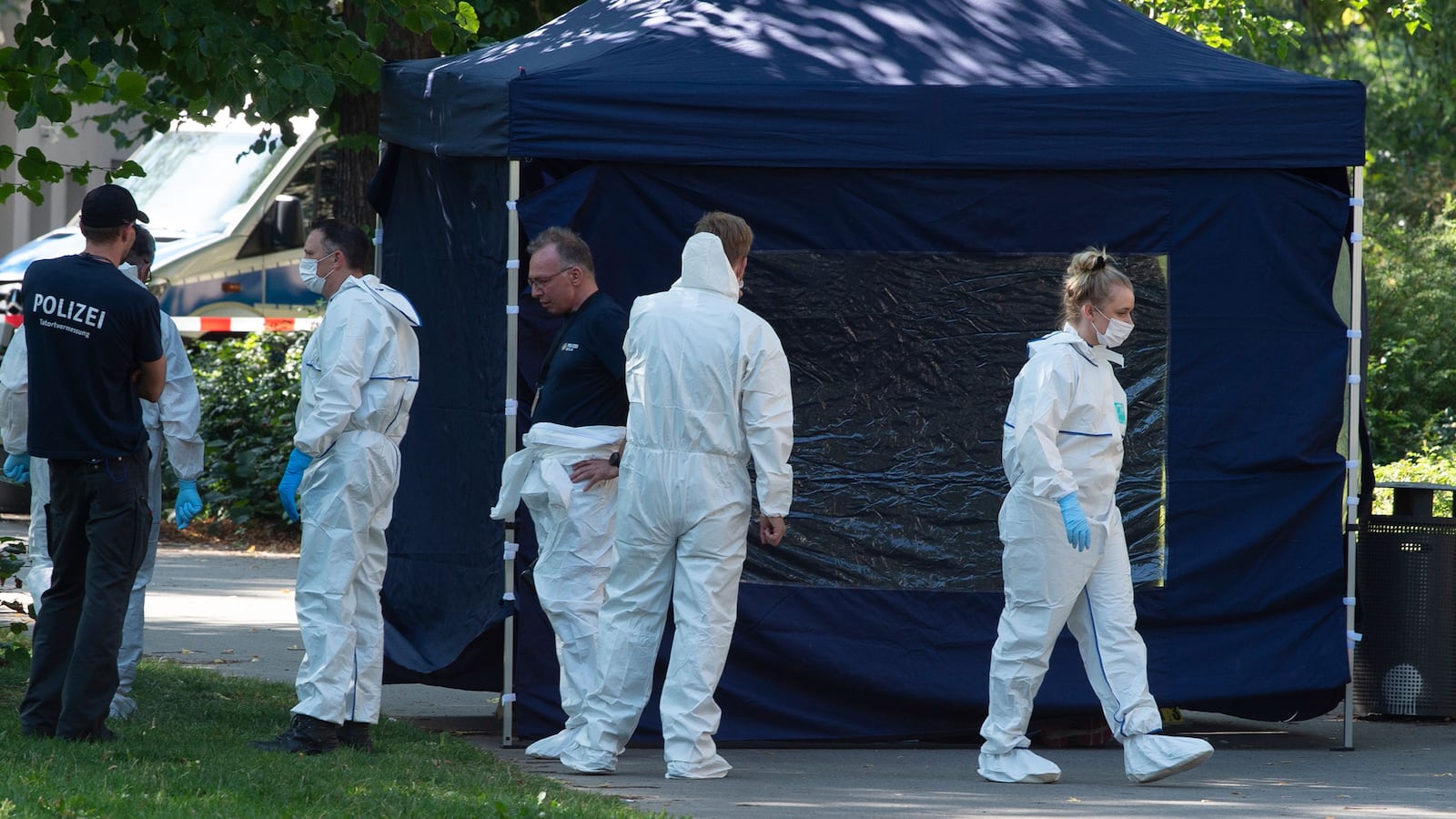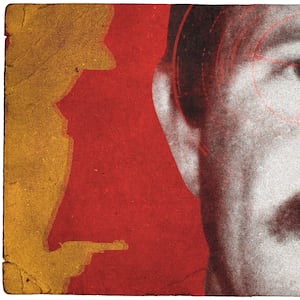TBILISI, Georgia—He walked two blocks behind me and insisted on a café or restaurant that was sparsely populated. Given the circumstances, I couldn’t blame him.
“Levan,” as I’ll call him, was once a senior official in Georgia’s interior ministry. According to two current Georgian officials, he was also the recruiter and handler of Zelimkhan Khangoshvili, the 40-year-old ethnic Chechen from Georgia’s Pankisi Gorge region who was shot in the head and killed in central Berlin on Aug. 23 as he headed to a local mosque to attend Friday prayers.
Khangoshvili’s daylight murder in the Kleiner Tiergarten, a park full of people, bore all of the hallmarks of a carefully orchestrated assassination, a fate common to Kremlin opponents, the kind of killing to which Europe has lately grown accustomed.
The assassin took a sinuous route from Russia to Germany through France and Poland. His murder weapon was a Glock 26 with a silencer affixed. And his tradecraft—a careful disposal of the gun, a wig, and the getaway bicycle in the Spree River, followed by a quick change of costume and appearance—contradict any suggestion of this having been a random or spontaneous crime.
Unsurprisingly, all signs point to Moscow’s culpability.
Khangoshvili was certainly a longtime target of the Russian government. As a battle-tested veteran of the Second Chechen War, a separatist struggle Vladimir Putin brutally suppressed in his first presidential term, he commanded enormous respect from kisti, the term for ethnic Chechens in Pankisi Gorge. A close confidant was Aslan Maskhadov, Chechnya’s democratically elected president, who was killed in a 2005 raid by the FSB, Russia’s domestic intelligence agency.

And while it has been reported previously that Khangoshvili cooperated with the Georgian interior ministry as an interlocutor with his fellow kisti, The Daily Beast has learned that he was more like a full-fledged spy.
He worked closely under Levan’s direct supervision and protection for six years, passing along crucial intelligence on jihadi activity. His information, Levan said, helped neutralize an Uzbek extremist organization targeting the Caucasus and quell Islamist restiveness following Georgia’s entry into the NATO-led war in Afghanistan.
Khangoshvili also acted in a counterintelligence capacity, his former handler claimed, informing on members of his native community who had been recruited by the FSB or agents of pro-Putin Chechen strongman Ramzan Kadyrov. He even flipped one.
“There was a case when he brought a Georgian who was recruited by the Russians,” Levan said. “He got the guy to surrender to our authorities. That person in turn rendered his services to the Georgian state. He became a double agent, thanks to Zelimkhan.”
American counterterrorism officials not only found Khangoshvili’s intelligence credible and useful; in one remarkable instance, according to Levan, they operationalized it.
“Zelimkhan introduced me to a Chechen who I then introduced to our American colleagues. The Americans employed him right there in the CIA station Tbilisi, paying him money based on Zelimkhan’s assessment of him.” That agent subsequently was sent abroad by the CIA.
Levan’s story “rings true,” according to John Sipher, who served as deputy director of Russia operations at the CIA in the early 2000s. “It shows the non-stop ugly games the Russians play in other countries,” Sipher said. “They feel unafraid to engage in surveillance, espionage, and murder. In this case”—the Berlin murder of Zelimkhan Khangoshvili—”they killed someone who was helping to keep the region safe from Islamic terrorists.”
Khangoshvili was repatriated from the pocked battlefields of Grozny in 2006 and his return to his native Georgia wasn’t exactly greeted with enthusiasm. “Our initial perception of Zelimkhan wasn’t clear at first,” Levan said. “We weren’t sure if he was on our side or not because he was freshly back from the Second Chechen War and we didn’t know if he was a radical.”
Ironically, it was an interdicted assassination attempt against the retired separatist that made him trust his government—and Levan. “There was an assassin, a South Ossetian who was hired by Russia to kill Zelimkhan and two Georgian officials,” Levan said. “The assassin got cold feet and turned himself into us in 2006. He had been jailed in Russia for armed robbery and recruited by the security services. We called Zelimkhan and informed him of the plot. After that, he developed trust toward the Georgian government. Our cooperation—our friendship, really—started.”
That friendship only grew stronger after Khangoshvili returned the favor during the notorious Lopota Gorge incident in 2012, in which 17 armed Islamist insurgents, some of them Russian citizens, attempted to steal across the Georgian border into Dagestan. What followed was a violent standoff with the Georgian military, which lasted three days. At the end of it, 14 people were dead, three on the government’s side: two troops from the interior ministry’s special purpose unit and one army corporal.
Had the militants successfully crossed the border, they could easily have prompted another confrontation between Moscow and Tbilisi, a mere four years on from Russia’s internationally condemned invasion of Georgia. Georgia’s president at the time, Mikheil Saakashvili, openly referred to the incident as a provocation designed to do just that.
Khangoshvili was later cited in the regional news outlet Caucasian Knot as a “negotiator” with the insurgents, two of whom he said he knew personally. In fact, according to Levan, he did a lot more than parley with them.
As an interior ministry counterterrorism official, Levan was dispatched to Lapankuri village, the scene of the crisis, to convince the Islamists to disarm and surrender. He persuaded them to release a captured Georgian border guard, but they refused his other terms. Instead, the militants told Levan they would now be taking him hostage as leverage for further negotiations with Tbilisi.

Because of his enduring moral authority with Chechens, Khangoshvili accompanied Levan to this dramatic encounter and formulated his handler’s escape plan. He lured the insurgents to another location that had better cellphone reception under the pretext of allowing Levan to call his higher-ups back at the interior ministry and update them on the insurgents’ demands.
“Two of the armed Chechens followed us to a place where we could make a call,” Levan recounted. “Zelimkhan said ‘Keep walking.’ He got them to steadily increase their distance from me. They followed behind. About 100 meters away there was was a Georgian special forces position. Zelimkhan tricked them into walking right into an ambush.”
Khangoshvili was driven off once he reached the military outpost. Then the shooting began. One of the Islamists was killed in the firefight with Georgian soldiers; 10 would be killed later in a separate clash.
“If not for Zelimkhan, I’d be dead,” Levan stated matter-of-factly, adding that his asset’s quick thinking not only eliminated a national-security threat to Georgia, but also a potential one to Russia.
Nor were the would-be border-crossers a collection of weekend warriors. Akhmed Chatayev, one of the survivors of the Lopota Gorge incident and a Russian citizen, was arrested but later acquitted at trial. He then resurfaced in 2015 as the head of an elite ISIS battalion in Syria. A year later, he masterminded the terror group’s suicide bombing of Ataturk International Airport in Istanbul, an atrocity that killed 45, before being killed by Georgian special forces in a 20-hour siege in Tbilisi at the end of 2017.
Khangoshvili would later inform on another jihadi from Pankisi wanted by virtually every nation on the planet. Tarkhan Batirashvili, better known by his nom de guerre Abu Omar al-Shishani, at one point ran ISIS’ military occupation of Aleppo. When it became known that Shishani, a former Georgian commando trained by U.S. Special Forces and a veteran of the 2008 war with Russia, had gone off to Syria to join the terrorist group, Khangoshvili profiled him for Levan.
It would prove one of his last interventions on behalf of his country.
In 2012, a more Moscow-friendly government came to power in Tbilisi, and Khangoshvili became leery of further cooperation with an interior ministry whose staff, including Levan, was being purged in favor of loyalists to the new ruling party led by Georgian oligarch Bidzina Ivanishivili.
Then came another assassination attempt.
In 2015, Khangoshvili was driving in Tbilisi, not far from his home, when a gunman approached his car and opened fire from three meters away. “Zelimkhan was stopped at a traffic light at Gagarin Square,” Levan said, “and amazingly all of the bullets—seven or eight—went into his arm. He had hugely thick arms. He was close to a hospital and drove himself there afterwards.”
The shooting took place in full view of CCTV cameras, yet the would-be assassin was never identified, much less apprehended. The Human Rights and Monitoring Center, a Georgian NGO, found that the government undertook a “pro forma” investigation “characterized by significant legal flaws,” which included allowing recorded evidence of the crime to be destroyed and failing to provide state protection for Khangoshvili and his family.

“After that,” Levan said, “Zelimkhan developed a conviction that the Georgian authorities were cooperating with the Russians. He didn’t believe he was safe in Georgia anymore. And he was right.”
Khangoshvili emigrated, first to Ukraine, then to Poland, before winding up in Germany, where he’d been pursuing asylum right up until his untimely demise. Khangoshvili wasn’t just exposed to enemy action from abroad in his final port of exile; he was held under suspicion by the authorities.
Since his murder, leaks by German intelligence, no doubt abetted by years of pro-Kremlin disinformation, have variously painted a portrait of a violent minority extremist who got what was coming to him or of a man on the lam from a messy entanglement with organized crime. Khangoshvili’s six-year stint as the valued asset of a European security service, and an indirect source for an American one, counted for nothing.
Levan laughed off Berlin’s allegations, which he attributed to Chancellor Angela Merkel’s desire to avoid a major row with Moscow over one dead asylum-seeker. The man Levan had relied on to protect Georgia from religious and state terrorism, he claimed, was a womanizer who offered no resistance to his wife’s request for a divorce and who loved German beer. “He was as much a jihadist as I am,” Levan insisted.
“It was his birthday a week before his murder. I called him to wish him happy birthday and he told me to visit him in Berlin so we could hit the bars together. And he wanted desperately to come back to Georgia.”
According to Der Spiegel journalist Maik Baumgartner, who has reported extensively on Khangoshvili’s murder, German authorities indeed know that the victim posed absolutely no threat to them or the German state. “Funnily enough, Khangoshvili’s hotel in Berlin was located right across the street from the headquarters of the BND,” Baumgartner told me, referring to the German foreign intelligence agency.
Nevertheless, Khangoshvili had been designated by the Federal Criminal Police Office in Berlin as “Gefährder,” someone considered capable of committing a criminal offense. That designation was only lifted a few weeks before his shooting because, Baumgartner said, citing a source from the office from the Federal Criminal Police Office, “they realized Khangoshvili never visited an Islamist mosque in Berlin. Better late than never, but still stupid.”
Khangoshvili’s assassin, meanwhile, remains in police custody following his capture and arrest in the shrubbery of Kleiner Tiergarten. U.S. intelligence has identified him as a Russian ex-convict sentenced for murder who, upon his release from prison, was somehow granted a legitimate passport from the Russian state in the false name of Vadim Sokolov. Bellingcat’s Christo Grozev, who is working to expose the culprit based on the hastily assembled “legend” he used, told me that U.S. intelligence got the wrong guy: Khangoshvili's killer isn’t an ex-con but rather a Russian “government actor.”
This clearly orchestrated act of foul play comes little over a year after the failed assassination of Sergei Skripal, a Russian military spy turned British defector, and his daughter Yulia, in the sleepy English cathedral city of Salisbury.
As the digital forensic website Bellingcat observed, the Russian border control system, which issued the passport, is controlled by the FSB, an agency that has handled the bulk of Russia’s operations in Georgia owing to the Kremlin’s belief that the affairs of this sovereign post-Soviet nation remain a “domestic” rather than foreign consideration.
Yet the Russian hit men responsible for trying to murder Skripal with the nerve agent novichok, who have since been identified as officers of the GRU, Russia’s military intelligence agency, were issued passports by the same Moscow unit of the Federal Migration Service that issued Sokolov’s.
Like theirs, Bellingcat noted, Sokolov’s passport was issued without any biometric data, the inclusion of which has been the default option for all Russian passports since 2009, except “in emergency situations when the applicant has no time to wait for the fingerprint encryption and printing process.” In fact, 20 GRU operatives outed by Bellingcat in recent years, including Skripal’s hit team, have used these “old-style” passports in ultimately futile attempts to hide their cover identities.
Whatever Russian spy agency lies behind Khangoshvili’s murder, Levan doesn’t really care. “FSB, GRU,” he said, “they’re all our enemies.”



